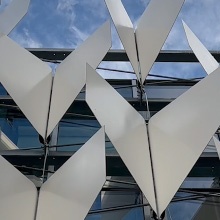Funding
On the German side by German Federal Ministry for Economic Affairs and Climate Action within the framework of the Central Innovation Program for SMEs (ZIM) and on the Austrian side by the Federal Ministry of Labour and Economy and Economics and the Federal Ministry for Climate Action, Environment, Energy, Mobility, Innovation and Technology via the Austrian Research Promotion Agency (FFG).
Funding Period
January 2022 – December 2023
Description
The focus of the international research project "Flectuation" is the foundational development of adaptive façade components (shading elements) made of thermoplastic fiber-reinforced plastics (FRP). The deformation of the adaptive façade components is realized by pneumatic actuators integrated in the material structure. The energy required for actuation (approx. 0.2 kWh/m²a) is to be provided by the component itself: The energy is generated by photovoltaic elements applied to the surface of the component, which shall provide about 45 kWh/m²a of energy when exposed all year round.
The control of the shading units should regulate not only the position for optimal shading of the interior, the supply of daylight and the anti-glare effect in the interior (efficiency of the shading), but also the orientation of the photovoltaic foils to the position of the sun (energy generation).
Based on the underlying material concept for thermoplastic and adaptive façade components, a material catalog will also be developed. With the help of this material catalog, future semi-finished products (organic sheets) can be selected depending on the necessary deformation and the component geometry.
Based on the parameterized material catalog, the fast, uncomplicated industrial production of adaptive FRP components with varying geometric shapes and integrated actuators, including an integral control system, is to be implemented within the project. The automation of the processes for the reproducibility of material properties and fast manufacturing is the focus of the project work – in addition to material-related research aspects. Starting with the conceptual development of possible kinetic components for adaptive facade shading systems, their functionality and feasibility will be tested with the targeted thermoplastic material combination.
Project Team
ITKE Institute for Building Structures and Structural Design
Universität Stuttgart
Prof. Dr.-Ing. Jan Knippers, Dr.-Ing. Axel Körner, Edith A. Gonzalez
ITFT Institute for Textile and Fiber Technologies
Universität Stuttgart
Prof. Dr.-Ing. Götz T. Gresser, Dr.-Ing. Larissa Born, Matthias Ridder
Jehle Technik GmbH
Alexander Jehle, Uwe Boerboom, Sai Konduri
HELLA Sonnen- und Wetterschutztechnik GmbH
Gerald Lukasser, Robert Weitlaner, Stephan Moser
Formfinder Software GmbH
Robert Roithmayer
Associated Partners
KREMPEL GmbH
Publications within the scope of the project
Moser S, González EA, Körner A, Born L, Gresser GT, Knippers J (2023) Datengesteuerte Regelungsstrategie mittels einer modellbasierten Evaluierung: Anwendung an einer adaptiven Fassade in Freiburg. In Proceedings LICHT 2023. LICHT 2023, Salzburg, Austria, 26.03.-29.03.2023. https://licht2023.at/wp-content/uploads/2023/07/Moser-Stephan.pdf
Gonzalez EA, Moser S, Körner A, Born, L, Gresser GT, Weitlander R, Knippers J (2023) ADVANCING SOLAR CONTROL AND ENERGY HARVESTING THROUGH THE USE OF PNEUMATICALLY ACTUATED ELASTIC ADAPTIVE FAҪADES. In Proceedings 10th ECCOMAS Thematic Conference on Smart Structures and Materials, Padras, Greece, 03.07.-05.07.2023. https://www.eccomasproceedia.org/conferences/thematic-conferences/smart-2023/982
Contact

Edith A. Gonzalez
M.Sc. M.Arch.Research Associate

Axel Körner
Dr.-Ing.Research Group Leader (Akademischer Rat)



